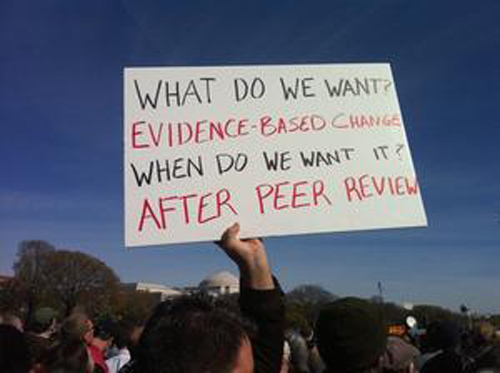 The negative impacts of the minimum wage are things in which economists find themselves in greatest agreement.
The negative impacts of the minimum wage are things in which economists find themselves in greatest agreement.
Worse, those negative impacts aren’t randomly distributed. The people who are disemployed by high minimum wages tend to be the least skilled, the poorest, the least educated.
That is, the ones who most need the work are the ones who get hurt the most.
Strangely (or worse, not strangely), progressives have lately been preaching the idea that forcing a much higher wage floor is a “moral” cause.
As an economist and an advocate for beneficial policies for the poor — actually beneficial, not superficially beneficial; i.e., not with net real harm on top of the moral preening — I find the “Fight for $15” movement distressing.
So I was gratified to read this in the Washington Post today out of Montgomery County, Maryland:
EVIDENCE-BASED POLICYMAKING is a hot concept in government these days, but politicians still often draft legislation or propose regulations based on what they think voters will like — not the public interest as demonstrated by objective data.
A notable exception has been the recent response of Montgomery County Executive Isiah Leggett (D) to efforts by members of the County Council to raise the county’s minimum wage from the current $11.50 per hour to $15 per hour.
In January, Mr. Leggett vetoed a bill, passed on a 5-to-4 vote, that would have raised the minimum to $15 by 2020. He cited cost increases to the county government and the likely negative impact on the county’s economic competitiveness. However, advocates of a $15 minimum are trying again, with Council member Marc Elrich (D-At Large) recently introducing a bill slightly adjusted to address some of Mr. Leggett’s objections.
Wisely, Mr. Leggett’s veto message called for an objective economic study of the probable consequences, intended and unintended, of the proposed hike — which would leave Montgomery as the highest-minimum-wage jurisdiction in the area except for the District. Proponents of the increase should have waited for the results of this study; they’ve just come in, and they vindicate Mr. Leggett’s caution.
The study was by Philadelphia-based consulting group PFM. I haven’t had a chance to review it, so I don’t know the assumptions built into the model, but its findings are well in keeping with the direction expected by the economics of the minimum wage (not to mention, the economics of imposing a higher price floor on a good in general). That is to say, their errors would be in the scope of the effects, not the direction.
They projected:
- a loss of almost 47,000 jobs
- a loss of $396.5 million in total income by 2022
- a reduction of nearly $41 million in expected county tax revenue between fiscal 2018 and fiscal 2022
Preventing such losses was quite an impactful veto!


